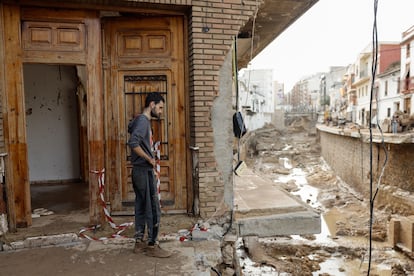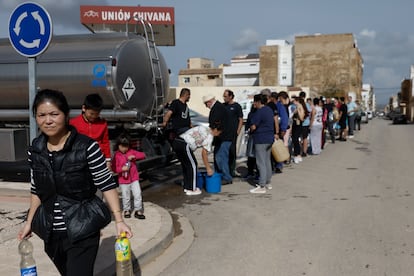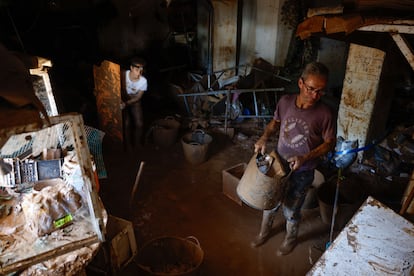Spanish villagers cast back to the 19th century by flash floods
The Valencian town of Chiva has been without electricity, water or communication for days while coming to terms with a heartbreaking death toll

Everything that people took for granted in Chiva is no longer there. The residents of the small Valencian town that registered record rainfall on Tuesday, October 29, cannot call each other on the phone. They have no way to locate those missing or listen to the radio. They do not know for sure what is happening in their town, much less in the surrounding areas.
The only things they know are through word of mouth. Those who still have their homes intact can’t flush the toilet or take a shower. There is a lack of food and drinking water. Since the storm that dumped 420 liters of water per square meter in the area, these nearly 17,000 residents have been without running water, electricity, a phone signal, or internet. Sending a WhatsApp is now considered a luxury of the past in a town where at least 10 people have died. The death toll, however, is likely to be higher as many are still missing.
“We will possibly reach 100 dead because hundreds and hundreds of cars have been wrecked,” Chiva’s mayor, Amparo Fort, told the Efe news agency. “We expect there to be quite a few casualties. Every time you put a dog our there or a shovel in the mud, bodies appear.”

The floods split the town in two. The water gushed through the Rambla del Poyo, sweeping away bridges, hundreds of cars and several houses. Some houses were torn in half. What made everything worse, according to the town’s parish priest Javier Costa, is that the cars that were pulled along by the floods then blocked the sloped streets that would normally drain the rainfall, effectively trapping people in rising water. The water rose and rose until, in some cases, people were drowned. “I’m at a loss for words,” says Salvador Martínez, 52, after pulling a tree out of his garage. “We are alive, which is the important thing, but we don’t know anything. We have no information,” he adds, referring to those still missing.
Mari Luz died close to Martínez. She was drowned in her house. Her family was trying to contact her to no avail but her neighbor, Jésica Besteiro, knew something had happened to her when the water rose above the level of the doorbell and she did not see her leaning out of the upstairs window. “She was always in. We shouted, ‘Mari Luz, Mari Luz!’ but she was gone,” she says.
Chiva feels isolated and is crying out for help. Besteiro is one of the many residents outraged by the fact they are having to try to tackle the fallout from the storm alone, with local volunteers. “The only thing I ask is that there is no lack of food because I have a baby, but the town council has not given us anything. Nor has the Civil Guard. You see them about in groups of 15, but not getting their hands dirty,” she claims, herself smeared with mud from head to toe. The mayor has recognized that there is an urgent need for food and water because there are already tussles among the locals to get their hands on basics.
Almost three days after the storm, the residents of Chiva mobilize. The town hall is noting down on paper all the damage and the missing residents. People are flocking to the local youth center, which is full of junk but has electricity and intermittent internet. They also gravitate towards the butcher’s shop, which is getting rid of its meat due to the lack of refrigeration. Trips are made to a water pump that fills dirty drums to clean floors and flush the toilet. “This is chaos,” says José, a member of the town’s municipal brigade. “There’s no help. It’s just us.”

Francisco Esteso, Chiva’s chief police commissioner, is more diplomatic about the lack of outside help. “We need food, volunteers to clean the streets and houses, ambulances, and petrol,” he says. There is even a lack of shovels to clean up the mud. The situation, he adds, is “catastrophic.”
“The ravine has swept away any number of cars and also the tarmac,” he explains. “The urbanizations are cut off and there are people who need food and medicine. It is desperate. The worst thing is the anxiety and a feeling of helplessness because we aren’t able to get to all the places they are calling us from.”
Finally, two days after the storm, regional premier Carlos Mazón asked the Defense Ministry for help from the army, which already had 1,200 troops deployed in the region to distribute aid. The Defense Ministry agreed to send 500 more who would also clear the roads.
To date, Chiva remains isolated. Although the roads to Madrid have been reopened, cars and trucks still block the highway to nearby Valencia. Dozens of vehicles have piled up since Tuesday, making it impossible to reach Chiva from the regional capital. “Just walk, but who knows what you’re going to find,” says one police officer. Less than half an hour later, a body was unearthed on the road to Valencia. On the far side of the same highway, a boy could be heard looking for his father, sobbing with distress.
Sign up for our weekly newsletter to get more English-language news coverage from EL PAÍS USA Edition
Tu suscripción se está usando en otro dispositivo
¿Quieres añadir otro usuario a tu suscripción?
Si continúas leyendo en este dispositivo, no se podrá leer en el otro.
FlechaTu suscripción se está usando en otro dispositivo y solo puedes acceder a EL PAÍS desde un dispositivo a la vez.
Si quieres compartir tu cuenta, cambia tu suscripción a la modalidad Premium, así podrás añadir otro usuario. Cada uno accederá con su propia cuenta de email, lo que os permitirá personalizar vuestra experiencia en EL PAÍS.
¿Tienes una suscripción de empresa? Accede aquí para contratar más cuentas.
En el caso de no saber quién está usando tu cuenta, te recomendamos cambiar tu contraseña aquí.
Si decides continuar compartiendo tu cuenta, este mensaje se mostrará en tu dispositivo y en el de la otra persona que está usando tu cuenta de forma indefinida, afectando a tu experiencia de lectura. Puedes consultar aquí los términos y condiciones de la suscripción digital.









































